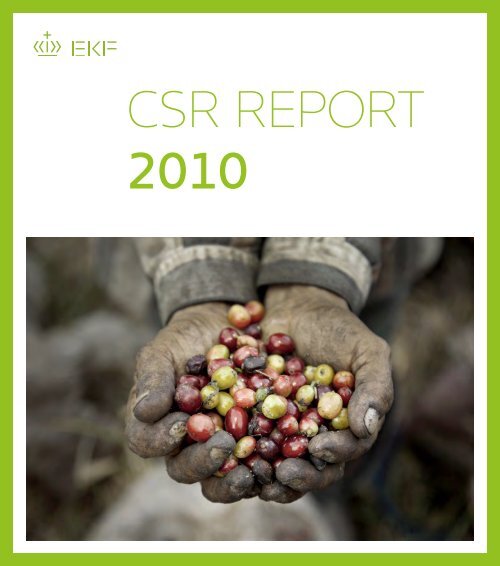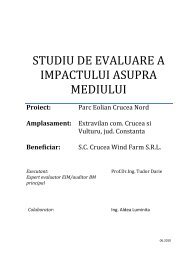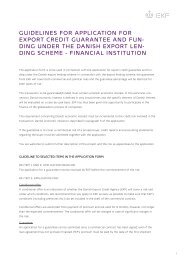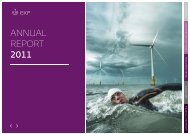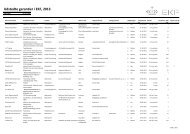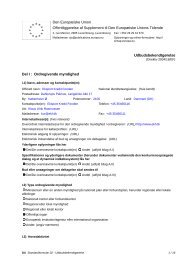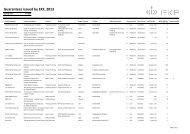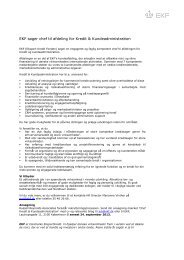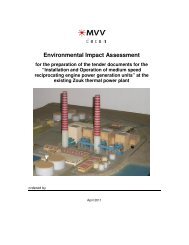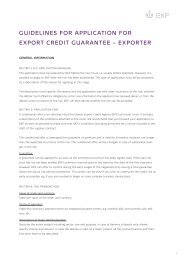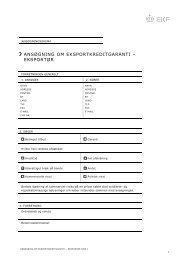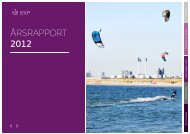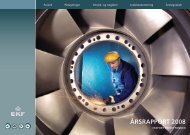CSR REPORT 2010 - EKF
CSR REPORT 2010 - EKF
CSR REPORT 2010 - EKF
You also want an ePaper? Increase the reach of your titles
YUMPU automatically turns print PDFs into web optimized ePapers that Google loves.
<strong>CSR</strong> <strong>REPORT</strong><br />
<strong>2010</strong>
<strong>CSR</strong> <strong>REPORT</strong> <strong>2010</strong><br />
CONTENTS<br />
PAGE 2 PAGE 3<br />
CONTENTS<br />
GRI APPLICATION LEVEL<br />
C C+ B B+ A A+<br />
Mandatory Self statement √<br />
6 INTRODUCTION<br />
6 Foreword by CEO Anette Eberhard<br />
Optional<br />
Examined by<br />
third parties<br />
Optional GRI checked √<br />
8 Who we are – and what we do<br />
8 <strong>CSR</strong> Report <strong>2010</strong> – UN Global Compact and GRI<br />
12 <strong>CSR</strong> RESULTS IN <strong>2010</strong><br />
22 THE CHALLENGES AHEAD<br />
26 THE PROCESS OF ISSUING A GUARANTEE<br />
28 Economy<br />
29 Environment and people<br />
32 When assessing Environment<br />
32 When assessing People<br />
32 Approve or reject<br />
36 SCOPE OF THE <strong>REPORT</strong><br />
39 List of Abbreviations<br />
CONTENTS<br />
PRINTER-FRIENDLY
INTRODUCTION
<strong>CSR</strong> <strong>REPORT</strong> <strong>2010</strong><br />
PAGE 6 PAGE 7<br />
INTRODUCTION<br />
INTRODUCTION<br />
FOREWORD BY CEO ANETTE EBERHARD<br />
menting new schemes and products – including<br />
tified challenges. Therefore, in <strong>2010</strong> we concen-<br />
initiative in Denmark, where we are volunteer-<br />
I am pleased to present <strong>EKF</strong>’s third Corporate<br />
ensuring compliance with our <strong>CSR</strong> policy.<br />
trated on finalising and implementing the strategic<br />
ing to be a mentor for new signatories of the<br />
Social Responsibility (<strong>CSR</strong>) report integrat-<br />
The schemes brought to <strong>EKF</strong> from the Danish<br />
project “Openness”, which has resulted in a policy<br />
UN Global Compact. In doing so, we hope again<br />
ing all our efforts in regard to <strong>CSR</strong>. At the same<br />
Parliament in 2009 together with the developed<br />
on Openness, a Code of Conduct and an introduc-<br />
to demonstrate that we firmly support the UN<br />
time, the report is also our Communication on<br />
new products in <strong>2010</strong> contributed to <strong>EKF</strong>’s larg-<br />
tion to <strong>EKF</strong>’s way of doing business including the<br />
Global Compact and its ten principles.<br />
Progress (CoP) honouring our obligation to report<br />
est ever exposure of DKK 55.6 billion.<br />
disclosure of a variety of information on specific<br />
in respect of our participation in the UN Global<br />
guarantees – all published on www.ekf.dk.<br />
Compact.<br />
Such growth in our business called for a review of<br />
<strong>EKF</strong>’s business strategy including the creation of<br />
Our wish to give <strong>EKF</strong>’s stakeholders a deeper in-<br />
<strong>2010</strong> was characterized by a high level of activity,<br />
a new generation of business goals and strategic<br />
sight into our activities – and to share our experi-<br />
stemming from the 148 applications processed<br />
focus areas. The review once again confirmed that<br />
ence in the <strong>CSR</strong> area, also resulted in our enrol-<br />
during the year, as well as the challenges of imple-<br />
<strong>CSR</strong> is integral to our business strategy and way<br />
ment in the UN Global Compact mentor-mentee<br />
of doing business.<br />
A consequence of the increase in<br />
<strong>EKF</strong>’s business has been the need to<br />
focus and prioritise the daily work<br />
leaving less room for development –<br />
also in the field of <strong>CSR</strong>. The missing<br />
fulfilments of some of our <strong>CSR</strong> goals<br />
for <strong>2010</strong> bear witness hereof. On the<br />
other hand, <strong>EKF</strong> has chosen to report<br />
on application level A according<br />
to GRI – an achievement in itself.<br />
In our <strong>CSR</strong> work the need to focus<br />
was facilitated by our already iden-<br />
CONTENTS<br />
PRINTER-FRIENDLY
<strong>CSR</strong> <strong>REPORT</strong> <strong>2010</strong><br />
PAGE 8 PAGE 9<br />
INTRODUCTION<br />
WHO WE ARE – AND WHAT WE DO<br />
<strong>EKF</strong> is the Danish Export Credit Agency. <strong>EKF</strong> is an independent administrative unit under the Danish State,<br />
and was established by law in 1999. <strong>EKF</strong> is managed by an Executive Board of Directors consisting of<br />
eight persons appointed by the Minister for Economic and Business Affairs.<br />
<strong>EKF</strong> offers insurance against the extraordinary commercial and political risks that are not covered by private<br />
credit insurance. Furthermore, as from 2009 <strong>EKF</strong> provides export loans, working capital guarantees<br />
and short-term reinsurance guarantees.<br />
For further information on <strong>EKF</strong>, our activities and markets please refer to www.ekf.dk.<br />
The <strong>CSR</strong> report is published in English and as an online electronic version only which is permanently available<br />
on www.ekf.dk. For further information about this report, contact Iben Tjelum, responsible for <strong>CSR</strong> at <strong>EKF</strong>:<br />
ibt@ekf.dk.<br />
<strong>CSR</strong> <strong>REPORT</strong> <strong>2010</strong> – UN GLOBAL COMPACT<br />
AND GRI<br />
The purpose of this report is to provide stakeholders<br />
with a complete and balanced view of<br />
<strong>EKF</strong>’s <strong>CSR</strong> performance in <strong>2010</strong>. The report is<br />
targeted at a wide range of stakeholders including<br />
customers, financial institutions, ministries<br />
and NGOs. In order to address communication<br />
requirements of the different target groups <strong>EKF</strong>’s<br />
<strong>CSR</strong> Report <strong>2010</strong> consists of two parts, the “<strong>CSR</strong><br />
Report <strong>2010</strong>” and the “<strong>CSR</strong> Fact Book <strong>2010</strong>”. The<br />
report provides an overview of the <strong>EKF</strong> <strong>CSR</strong> performance<br />
in <strong>2010</strong>, and the “<strong>CSR</strong> Fact Book <strong>2010</strong>”<br />
containes more detailed information on our environmental<br />
process and an audit of 13 projects as<br />
well as <strong>EKF</strong>’s <strong>CSR</strong> work and results in <strong>2010</strong>.<br />
The report – like our <strong>CSR</strong> policy (see www.ekf.dk)<br />
- is structured according to the triple bottomline,<br />
offering the reader an inside look into <strong>EKF</strong>’s<br />
daily work regarding Economy, Environment and<br />
People.<br />
CONTENTS<br />
PRINTER-FRIENDLY
<strong>CSR</strong> RESULTS<br />
IN <strong>2010</strong>
<strong>CSR</strong> <strong>REPORT</strong> <strong>2010</strong> <strong>CSR</strong> RESULTS IN <strong>2010</strong><br />
PAGE 12 PAGE 13<br />
<strong>CSR</strong> RESULTS IN <strong>2010</strong><br />
In <strong>2010</strong>, 148 applications were screened for impacts<br />
on people and the environment of which<br />
31 projects were considered to have potential significant<br />
impacts (category A or B projects) and<br />
therefore underwent a full social and environmental<br />
review by independent consulting companies.<br />
89 of the 148 applications became guarantees.<br />
Category A and B projects with a contract value<br />
for <strong>EKF</strong> in excess of SDR 10 million or more are<br />
included in the annual audit of project sustainability<br />
performed by Grontmij I Carl Bro, an international<br />
consulting company. In <strong>2010</strong> this audit included<br />
13 projects.<br />
Furthermore, <strong>EKF</strong> was at the disposal of approximately<br />
460 exporters via the short term reinsurance<br />
scheme, and issued 4 export loans and 79<br />
working capital guarantees during <strong>2010</strong>.<br />
FIGURE 1 > COUNTRIES WHERE APPLICATIONS HAVE BEEN SCREENED DURING <strong>2010</strong><br />
The 148 screened applications related to projects in the following countries: Algeria, Australia, Azerbaijan, Bangladesh, Belarus,<br />
Belgium, Bosnia-Herzegovina, Brazil, Bulgaria, Cambodia, Chile, Costa Rica, China, Croatia, Curacao, Denmark, Dominican Republic,<br />
Egypt, Finland, France, Germany, Greece, Guatemala, Hungary, India, Indonesia, Iran, Iraq, Ireland, Israel, Italy, Jordan, Kazakhstan,<br />
Kenya, Laos, Latvia, Lebanon, Liberia, Lithuania, Malaysia, Maldives, Malta, Mexico, New Zealand, Nicaragua, Nigeria, Norway,<br />
Pakistan, Panama, Papua New Guinea, Philippines, Poland, Qatar, Romania, Russia, Slovakia, Spain, Sri Lanka, Sweden, Switzerland,<br />
Turkey, Uganda, Ukraine, United Arab Emirates, United Kingdom, USA, Uzbekistan, Vietnam, Yemen<br />
CONTENTS<br />
PRINTER-FRIENDLY
<strong>CSR</strong> <strong>REPORT</strong> <strong>2010</strong> <strong>CSR</strong> RESULTS IN <strong>2010</strong><br />
PAGE 14 PAGE 15<br />
When assessing <strong>EKF</strong>’s contribution to sustainable development the estimated volume and value of local<br />
employment generated in relation to the projects is a key parameter. In <strong>2010</strong>, all 13 projects contributed<br />
to local employment during the construction phase and 9 during the operational phase. The projects totalled<br />
around 1600 man-years, with an estimated value of EUR 13 million.<br />
<strong>EKF</strong>’s contribution to reduction in CO2-emissions related to project involvement is another key parameter.<br />
In <strong>2010</strong>, the relative reduction in CO2-emissions were 11 million tones.<br />
openness<br />
Based on an identified challenge in our <strong>CSR</strong> report<br />
2008, we launched the strategic project<br />
“Openness” in 2009. During <strong>2010</strong> first priority was<br />
the definitive implementation of our Openness<br />
project, turning an identified challenge into a new<br />
way of doing business:<br />
<strong>EKF</strong>’s <strong>CSR</strong> policy states that <strong>EKF</strong> wishes to be<br />
transparent in our business with due respect to<br />
customer confidentiality.<br />
The statement is two-sided for <strong>EKF</strong>: On one hand<br />
<strong>EKF</strong> wishes to inform the broad public about the<br />
institution and the results achieved. The public<br />
has a general interest in understanding how public<br />
money is spent and holding publicly owned entities<br />
accountable for their actions.<br />
On the other hand, <strong>EKF</strong> must weigh the private<br />
sector’s requests and needs for confidentiality as<br />
well as the challenge of collecting accurate and informative<br />
data.<br />
According to the Act on Eksport Kredit Fonden<br />
the Danish Public Administration Act shall not<br />
apply to the activities of <strong>EKF</strong>. However, <strong>EKF</strong> acknowledges<br />
that the society has evolved towards<br />
more openness and transparency. The expectations<br />
of what a single individual as citizen or customer<br />
should be able to access have risen accordingly.<br />
Furthermore, <strong>EKF</strong>’s wish to present <strong>EKF</strong> as<br />
a responsible and accountable organisation stipulates<br />
a larger degree of openness and transparency<br />
regarding <strong>EKF</strong>’s business.<br />
The scope of the Openness project embraced:<br />
> > an analysis of both selected financial<br />
institutions and our peer ECAs and their<br />
approach to disclosing information on their<br />
area of business and specific guarantees,<br />
> > the creation of a Code of conduct for <strong>EKF</strong>,<br />
> > an Openness policy,<br />
> > the practical implementation of <strong>EKF</strong>’s new<br />
Openness policy on www.ekf.dk.<br />
During <strong>2010</strong> a large task was establishing a methodology<br />
for retrieving data from our ERP-system,<br />
making them available and establishing new internal<br />
procedures to support the Openness policy.<br />
Based on our continuous dialogue with our stakeholders,<br />
we have realised, that e.g. NGOs would<br />
welcome a larger degree of transparency by <strong>EKF</strong>,<br />
while customers, especially exporters, naturally<br />
were more hesitant in respect of the disclosure of<br />
details regarding their guarantees. Therefore, the<br />
project itself and a draft of the future list of data<br />
to be disclosed on each issued guarantee were<br />
debated on meetings with a segment of our customers.<br />
Furthermore, <strong>EKF</strong> informed all stakeholders<br />
in a news mail prior to the final implementation<br />
of the project in July <strong>2010</strong>. These initiatives<br />
all contributed to the positive reception of our<br />
new openness experienced during <strong>2010</strong>.<br />
2011 and the coming years will provide <strong>EKF</strong> with<br />
practical experience with our new open and transparent<br />
approach. So far, our experience has been<br />
good, even though we have a challenge of convincing<br />
the buyers in foreign countries of the bliss<br />
of transparency when it comes to export credits.<br />
The result of the project including a list of issued<br />
guarantees has been accessible to our stakeholders<br />
on our web-site www.ekf.dk since summer<br />
<strong>2010</strong>.<br />
csr goals<br />
<strong>EKF</strong> has drawn up a number of <strong>CSR</strong> goals. We use<br />
the goals to direct and motivate <strong>EKF</strong> in the <strong>CSR</strong><br />
area; and thereby disclosing the management approach<br />
to <strong>CSR</strong>. Additionally, the purpose of the<br />
goals is to align our <strong>CSR</strong> efforts with the business<br />
efforts identified in <strong>EKF</strong>’s business strategy 2012.<br />
The <strong>CSR</strong> goals cover our performance according<br />
to the GRI indicator areas: economy, environment,<br />
labour practices, human rights, society as well as<br />
indicators for the financial sector. Furthermore,<br />
the goals are in line with our overall approach to<br />
<strong>CSR</strong>; the use of international standards in our<br />
work. Goals and results are listed on the next<br />
page.<br />
CONTENTS<br />
PRINTER-FRIENDLY
<strong>CSR</strong> <strong>REPORT</strong> <strong>2010</strong> <strong>CSR</strong> RESULTS IN <strong>2010</strong><br />
PAGE 16 PAGE 17<br />
GRI<br />
Indicator<br />
<strong>EKF</strong> goal 2009<br />
result<br />
<strong>2010</strong><br />
result<br />
<strong>2010</strong><br />
goal<br />
2011<br />
goal<br />
2012<br />
goal<br />
><br />
GRI<br />
Indicator<br />
<strong>EKF</strong> goal 2009<br />
result<br />
<strong>2010</strong><br />
result<br />
<strong>2010</strong><br />
goal<br />
2011<br />
goal<br />
2012<br />
goal<br />
EC 1<br />
Economy<br />
GRI<br />
Indicator<br />
FS 15<br />
Financial<br />
Sector<br />
GRI<br />
Indicator<br />
SO 3<br />
Social<br />
Exposure administered by <strong>EKF</strong> DKK 42.9<br />
bn.<br />
<strong>EKF</strong> goal 2009<br />
result<br />
The number of initiatives from <strong>EKF</strong><br />
that contribute to improved formulation<br />
and/or implementation of<br />
international agreements regarding<br />
sustainable use of officially supported<br />
export credits as defined in our <strong>CSR</strong><br />
policy<br />
4<br />
initiatives<br />
<strong>EKF</strong> goal 2009<br />
result<br />
<strong>EKF</strong>’s introduction programme for<br />
all new employees, should contain<br />
training in <strong>EKF</strong>’s policies and guidelines<br />
regarding anti-corruption<br />
DKK 55.6<br />
bn.<br />
<strong>2010</strong><br />
result<br />
4<br />
initiatives<br />
<strong>2010</strong><br />
result<br />
DKK 44.5<br />
bn.<br />
<strong>2010</strong><br />
goal<br />
5<br />
initiatives<br />
<strong>2010</strong><br />
goal<br />
DKK 57<br />
bn.<br />
2011<br />
goal<br />
5<br />
initiatives<br />
2011<br />
goal<br />
DKK 60<br />
bn.<br />
2012<br />
goal<br />
5<br />
initiatives<br />
2012<br />
goal<br />
n.a. 100% 100% 100% 100%<br />
LA 10<br />
Labor<br />
rights<br />
GRI<br />
Indicator<br />
HR 1<br />
Human<br />
Rights<br />
Minimum number of days, where<br />
employees participate in internal or<br />
external training and education<br />
<strong>EKF</strong> goal 2009<br />
result<br />
1. <strong>EKF</strong> screens all main business applications<br />
with regard to human/labor<br />
rights as defined by the IFC Performance<br />
standards<br />
2. <strong>EKF</strong> reviews all projects with regard<br />
to human/labor rights as defined by the<br />
IFC performance standards<br />
3. <strong>EKF</strong> includes human rights clauses in<br />
all projects above USD 10 mio. And in<br />
all other projects as necessary as triggered<br />
and defined by the IFC Performance<br />
standards<br />
3.9 days 4.5 days Minimum<br />
5 days<br />
<strong>2010</strong><br />
result<br />
<strong>2010</strong><br />
goal<br />
Minimum<br />
5 days<br />
2011<br />
goal<br />
Minimum<br />
5 days<br />
2012<br />
goal<br />
74 % 90% 100% 100% 100%<br />
GRI<br />
Indicator<br />
<strong>EKF</strong> goal 2009<br />
result<br />
<strong>2010</strong><br />
result<br />
<strong>2010</strong><br />
goal<br />
2011<br />
goal<br />
2012<br />
goal<br />
FS 10<br />
Financial<br />
Sector<br />
GRI<br />
Indicator<br />
EN 16<br />
Environment<br />
<strong>EKF</strong> engages in interaction with all<br />
clients regarding environmental and<br />
social issues<br />
<strong>EKF</strong> goal 2009<br />
result<br />
Goal will be established during <strong>2010</strong><br />
as a result of the development of a<br />
climate strategy for <strong>EKF</strong>. The goal<br />
should address <strong>EKF</strong>’s direct and indirect<br />
greenhouse gas emissions.<br />
100% 100% 100% 100% 100%<br />
n.a.<br />
<strong>2010</strong><br />
result<br />
Not<br />
achieved<br />
<strong>2010</strong><br />
goal<br />
To be<br />
defined<br />
in <strong>EKF</strong>’s<br />
climate<br />
strategy.<br />
2011<br />
goal<br />
To be<br />
defined<br />
in <strong>EKF</strong>’s<br />
climate<br />
strategy.<br />
2012<br />
goal<br />
To be<br />
defined<br />
in <strong>EKF</strong>’s<br />
climate<br />
strategy.<br />
Compared to the performance in 2009, there are<br />
improvements on all <strong>CSR</strong> goals except on EN 16,<br />
where the lack of developing a climate strategy<br />
has been postponed to 2011/2012. Several of<br />
the goals hold room for improvement, proving the<br />
goals to be exactly as ambitious as we aimed for.<br />
Due to market demand in 2009 and <strong>2010</strong> <strong>EKF</strong><br />
only <strong>EKF</strong>’s main business and consequently not<br />
three of the new products, read more on page 30-<br />
31.<br />
promoting csr in international fora<br />
In <strong>2010</strong> <strong>EKF</strong>’s focus was on active participation<br />
in the ongoing negotiations on the review<br />
of the OECD Environmental Recommendation<br />
GRI<br />
Indicator<br />
LA 7<br />
Labor<br />
rights<br />
<strong>EKF</strong> goal 2009<br />
result<br />
Days of absence due to illness (not<br />
including long term illness and first and<br />
second day of illness of a child)<br />
<strong>2010</strong><br />
result<br />
<strong>2010</strong><br />
goal<br />
5 days 4.6 days Maximum<br />
5 days<br />
2011<br />
goal<br />
Maximum<br />
5 days<br />
2012<br />
goal<br />
Maximum<br />
5 days<br />
><br />
established three new types of products, which<br />
brought <strong>EKF</strong> a new insight into the screening of<br />
applications. The new products resulted in a clarification<br />
of the accounting method of the HR 1<br />
goal as the goal from now on specificly embraces<br />
and through <strong>EKF</strong>’s membership of the Equator<br />
Principles on contributing to the IFC’s work on review<br />
of the IFC Performance Standards.<br />
<strong>EKF</strong> wishes to establish the use of the IFC PS as a<br />
main benchmark for projects. This would improve<br />
CONTENTS<br />
PRINTER-FRIENDLY
<strong>CSR</strong> <strong>REPORT</strong> <strong>2010</strong> <strong>CSR</strong> RESULTS IN <strong>2010</strong><br />
PAGE 18 PAGE 19<br />
the due diligence of ECA participation in projects<br />
and thus ensure a level playing field for Danish exporters.<br />
New issues introduced in <strong>2010</strong> include a more<br />
detailed consideration of human rights based on<br />
John Ruggie’s framework of three core principles<br />
“protect, respect, and remedy”; the State duty to<br />
protect against human rights abuses by third parties,<br />
including business; the corporate responsibility<br />
to respect human rights; and the need for<br />
more effective access to remedies.<br />
Moreover, <strong>EKF</strong> continued to play an active<br />
role in the negotiations on a revised Sector<br />
Understanding on Export Credits for Climate<br />
Change and Water Projects under the OECD<br />
Arrangement for Officially Supported Export<br />
Credits. Greenhouse gas reporting was introduced<br />
into the negotiations in <strong>2010</strong> and <strong>EKF</strong> worked towards<br />
simplicity and transparency in reporting of<br />
greenhouse gas emissions. The objective of simplicity<br />
and transparency is in line with <strong>EKF</strong>’s openness<br />
policy.<br />
The negotiations in the OECD on environment<br />
and climate will continue in 2011.<br />
As a member of the Equator Principles <strong>EKF</strong><br />
tested the application of the scope of the principles<br />
beyond project finance transactions to<br />
include corporate loans with known use of proceeds.<br />
In addition the EPFIs assisted the IFC with<br />
the review of the IFC Performance Standards<br />
and the OECD with the review of the OECD<br />
Environmental Recommendation. <strong>EKF</strong> also<br />
worked towards making more financial institutions<br />
embrace the principles. In addition <strong>EKF</strong> supported<br />
the Equator Principles’ dialogue with UN Special<br />
Representative for Human Rights John Ruggie.<br />
peer review<br />
A small peer review has been conducted on the<br />
basis of two OECD surveys, respectively the<br />
“OECD survey on the Environment and Officially<br />
Supported Export Credits” from <strong>2010</strong> and the<br />
“OECD survey on Bribery and Officially Supported<br />
Export Credits” from <strong>2010</strong>.<br />
Focusing on the integration of economy, environment<br />
and people in the risk analysis, transparency<br />
and anti-bribery measures, the review indicates<br />
that <strong>EKF</strong> performs on average either in line with<br />
or better than its peers. However, it should be<br />
noted that this is a qualitative evaluation of a<br />
general survey.<br />
Members to the recommendation on environmental<br />
review and to the recommendation on bribery<br />
in relation to export credits are generally complying<br />
with the requirements set forward in these<br />
agreements. In some cases, however, <strong>EKF</strong>’s internal<br />
procedures go further than what is the common<br />
practice among the majority of its peers:<br />
> > <strong>EKF</strong>’s case handling systematically includes<br />
environmental and social impacts of exports<br />
to existing operations as well as exports<br />
which are neither to existing operations nor<br />
to projects.<br />
> > <strong>EKF</strong> requires projects to comply with the<br />
IFC Performance Standards.<br />
> > <strong>EKF</strong> takes a strategic approach to<br />
openness with the Openness policy<br />
implemented in <strong>2010</strong>, and thus discloses<br />
information on issued guarantees.<br />
> > <strong>EKF</strong> produces an annual <strong>CSR</strong> report<br />
containing information on transactions<br />
with environmental impact apart from what<br />
is required in the OECD guidelines.<br />
> > Already in the application process, <strong>EKF</strong><br />
informs exporters of the legal consequences<br />
of bribery and encourages the development<br />
of appropriate management control systems<br />
that combat bribery.<br />
CONTENTS<br />
PRINTER-FRIENDLY
THE<br />
CHALLENGES<br />
AHEAD
<strong>CSR</strong> <strong>REPORT</strong> <strong>2010</strong><br />
PAGE 22 PAGE 23<br />
THE CHALLENGES AHEAD<br />
THE CHALLENGES AHEAD<br />
In last year’s report <strong>EKF</strong> listed some issues best<br />
characterised as challenges, to which <strong>EKF</strong> should<br />
respond in the coming years. The experience of<br />
identifying such challenges has been very fruitful.<br />
Not only has it helped focus and prioritise our<br />
<strong>CSR</strong> efforts in <strong>2010</strong>, it has also supported the<br />
<strong>CSR</strong> work as such and been the primary area of<br />
interest from our stakeholders.<br />
During <strong>2010</strong> we have worked on our challenges.<br />
One challenge, Openness, is no longer considered<br />
a challenge, but has become our new way of doing<br />
business.<br />
The <strong>CSR</strong> work in <strong>2010</strong> again highlighted challenges,<br />
to which <strong>EKF</strong> should respond in the future implementing<br />
our <strong>CSR</strong> policy.<br />
human rights<br />
<strong>EKF</strong> has chosen a principled approach in our <strong>CSR</strong><br />
policy. All of our transactions on main business<br />
are screened to comply with IFC’s Performance<br />
Standards and IFC’s Environmental, Health and<br />
Safety Guidelines.<br />
While we recognise that the principles are limited<br />
in scope as regards exposure to all of the internationally<br />
recognised human rights the following<br />
may be noted:<br />
1. <strong>EKF</strong> wants to maintain its principled<br />
approach to environmental and social<br />
standards;<br />
2. <strong>EKF</strong> believes that internationally<br />
recognised and operational standards<br />
- defining the private sector’s duty<br />
to respect - are a necessity for<br />
considering all recognised human<br />
rights;<br />
However, we currently have no access to principles<br />
and standards that enable a satisfactory consideration<br />
i.e. operationalisation.<br />
We look forward to the final result of the work of<br />
the Special Representative John Ruggie to the UN<br />
Human Rights Council. Furthermore, we await the<br />
reviews of both the OECD Common Approaches<br />
and the IFC Performance Standards. Results that<br />
together with the implementation of the Danish<br />
Governments’ Action plan for <strong>CSR</strong> hopefully will<br />
provide us with a future base and possible operationalisation<br />
of our principled approach during<br />
2011.<br />
the scale and method of assessing<br />
project sustainability<br />
<strong>EKF</strong> systematically screens and reviews its portfolio<br />
to identify potential impacts on people and the<br />
environment in the transactions. However, when<br />
performing the annual audit of the sustainability<br />
of the <strong>EKF</strong> project portfolio, only projects classified<br />
as category A and B according to the OECD<br />
Common Approaches and with a contract value<br />
for <strong>EKF</strong> in excess of SDR 10 million are included.<br />
This means, that even though all A and B projects<br />
no matter the size were reviewed according to the<br />
IFC Performance Standards, only 13 of the issued<br />
89 guarantees in <strong>2010</strong> are included in the audit<br />
– and therefore taken into account in the calculated<br />
sustainability impact related to <strong>EKF</strong>’s project<br />
portfolio.<br />
Additionally, we are using a methodology for the<br />
annual audit outlined in 2002, which given the development<br />
in the field since 2002 deserves to be<br />
reconsidered and possibly updated.<br />
At a stakeholder-meeting with representatives<br />
from industry, government and NGOs, several of<br />
the stakeholders requested <strong>EKF</strong> to consider including<br />
more transactions in the audit.<br />
Given the request from our stakeholders and the<br />
fact that significant development in calculating<br />
and assessing company impacts on people and<br />
environment has taken place since 2002, <strong>EKF</strong><br />
should reconsider both the scale and the method<br />
of estimating the impacts of our guarantees in reports<br />
to come.<br />
climate strategy<br />
The main impacts on economic and environmental<br />
sustainability and social responsibility stem<br />
from the projects <strong>EKF</strong> underwrites.<br />
Since 2002, <strong>EKF</strong> has published an annual audit<br />
of the sustainability of the <strong>EKF</strong> project portfolio,<br />
prepared by Grontmij I Carl Bro. Hence <strong>EKF</strong> either<br />
requires data on greenhouse gas emissions<br />
from our customers or calculate the emissions<br />
on the projects we are asked to guarantee, without<br />
having defined our own climate position as a<br />
company. This holds a certain amount of irony.<br />
Therefore, it would be a responsible thing for <strong>EKF</strong><br />
to respond to our own climate footprint by developing<br />
an overarching climate strategy incorporating<br />
both our external (projects) and our internal<br />
climate footprint. As a starting point <strong>EKF</strong> should<br />
chart and systematically calculate our internal<br />
emissions of greenhouse gasses. On that basis, initiatives<br />
and options should be mapped and thereby<br />
constitute the foundation of the development<br />
of a climate strategy for <strong>EKF</strong>.<br />
CONTENTS<br />
PRINTER-FRIENDLY
THE PROCESS<br />
OF ISSUING<br />
A GUARANTEE
<strong>CSR</strong> <strong>REPORT</strong> <strong>2010</strong><br />
PAGE 26 PAGE 27<br />
THE PROCESS OF ISSUING A GUARANTEE<br />
THE PROCESS OF ISSUING<br />
A GUARANTEE<br />
1 COUNTRY ASSESSMENT<br />
2 APPLICATION ASSESSMENT<br />
3<br />
APPROVAL/REJECTION<br />
> > <strong>EKF</strong>’s country policy<br />
> > National economy<br />
> > Commercial climate:<br />
--<br />
Corruption<br />
--<br />
Human rights<br />
--<br />
Sustainable lending<br />
> > Commercial risk<br />
> > Premium calculation<br />
> > Non-bribery declaration<br />
> > Corruption / Debarment list<br />
> > Environmental and social or sustainability impacts<br />
--<br />
IFC PS / OECD CA / EP<br />
--<br />
Dialogue with project participants<br />
--<br />
International standards<br />
--<br />
National law<br />
--<br />
Environment:<br />
--<br />
Choice of site<br />
--<br />
Sensitive areas<br />
--<br />
Nature / Biodiversity<br />
--<br />
Natural resources<br />
--<br />
Raw materials<br />
--<br />
Energy<br />
--<br />
Water<br />
--<br />
Waste<br />
--<br />
Waste water<br />
--<br />
Air emissions<br />
--<br />
People:<br />
--<br />
Child labour<br />
--<br />
Forced / Bonded labour<br />
--<br />
Guidelines on occupational and<br />
community health and safety<br />
--<br />
Health / Safety local employees<br />
--<br />
Labour rights<br />
--<br />
Resettlement<br />
--<br />
Rights of indigenous people<br />
--<br />
Economic displacements<br />
--<br />
Noise and vibrations<br />
> > Approval:<br />
--<br />
Issue of offer or guarantee<br />
--<br />
Premium invoice<br />
--<br />
Possible monitoring programme<br />
and / or actionplan for<br />
environmental and social<br />
sustainability<br />
> > Rejection:<br />
--<br />
Potential restructuring of project<br />
or<br />
--<br />
Rejection letter to applicant<br />
CONTENTS<br />
PRINTER-FRIENDLY
<strong>CSR</strong> <strong>REPORT</strong> <strong>2010</strong><br />
PAGE 28 PAGE 29<br />
THE PROCESS OF ISSUING A GUARANTEE<br />
<strong>EKF</strong>’s business is issuing export credit guarantees,<br />
as well as export loans, working capital guarantees<br />
and short term reinsurance guarantees. In<br />
our guarantee process we apply various aspects<br />
of our <strong>CSR</strong> policy and thus integrate <strong>CSR</strong> into our<br />
core business. Many of our stakeholders enquire<br />
about the guarantee process and the application<br />
of <strong>EKF</strong>’s <strong>CSR</strong> policy. Structured according to the<br />
triple-bottom line, here is what we do:<br />
ECONOMY<br />
The first step in ensuring application of <strong>EKF</strong>’s <strong>CSR</strong><br />
policy in the transactions that <strong>EKF</strong> covers is taken<br />
when determining <strong>EKF</strong>’s country cover policy.<br />
<strong>EKF</strong>’s country risk analysis primarily evaluates<br />
whether a country is willing and able to fulfil its<br />
payment obligations. In addition, an evaluation<br />
of the commercial climate of the country helps<br />
<strong>EKF</strong> in our risk assessment of the country and<br />
helps <strong>EKF</strong> to identify areas of potential risk concern.<br />
The evaluation of the commercial climate<br />
includes, inter alia, corruption indicators based on<br />
World Bank Doing Business indicators and indicators<br />
on the possible violation of human rights<br />
based on e.g. UNDP, Transparency International<br />
and Amnesty International. Thirdly, before a project<br />
in a Lower Income Country can be considered,<br />
<strong>EKF</strong>’s country risk team seeks assurances<br />
that their credit decisions are not likely to<br />
contribute to debt distress in the near future<br />
in line with OECD’s Principles on Sustainable<br />
Lending.<br />
The next step is to evaluate the individual application.<br />
<strong>EKF</strong> performs an evaluation of the commercial<br />
risk, being the financial strength of the buyer and/<br />
or project in proportion to the amount <strong>EKF</strong> is<br />
asked to cover. The evaluation is based on the<br />
borrower’s accounts and/or business plans. The<br />
commercial risk is classified from A to G, where A<br />
is sovereign risk, and G a non-acceptable risk.<br />
The extent of the commercial risk analysis of<br />
course varies with the size and nature of the individual<br />
transaction.<br />
An export credit guarantee is a type of insurance.<br />
Therefore, a premium has to be calculated and<br />
paid to obtain the requested cover. The pricing<br />
is based on the political risk – being the rating of<br />
the country the transaction is destined for, and<br />
the commercial risk – being the rating of the buyer<br />
and/or project. Minimum premiums are agreed<br />
within the OECD for the political risks and a new<br />
OECD premium model for commercial risk will be<br />
implemented as of September 2011.<br />
Prior to issuing the final guarantee, <strong>EKF</strong> requires<br />
that all policy holders sign a non-bribery declaration<br />
as well as inform <strong>EKF</strong> of any corruption<br />
charges or mention on debarment lists, as well as<br />
provide information on any agents used in connection<br />
with the specific export contract. A due<br />
diligence of the project and exporter/buyer will be<br />
undertaken by <strong>EKF</strong>’s legal department in the case<br />
of any indication of possible corruption.<br />
ENVIRONMENT AND PEOPLE<br />
As regards social and environmental issues, <strong>EKF</strong><br />
systematically evaluate and reviews the impacts<br />
of our transactions on people and the environment.<br />
The evaluation is an integrated part of the<br />
guarantee process and consists of an assessment<br />
of the available documentation and takes place<br />
in dialogue with the project participants and applicants.<br />
CONTENTS<br />
PRINTER-FRIENDLY
<strong>CSR</strong> <strong>REPORT</strong> <strong>2010</strong><br />
PAGE 30 PAGE 31<br />
THE PROCESS OF ISSUING A GUARANTEE<br />
The new schemes and products from 2009 and <strong>2010</strong> resulted in a differentiated method of systematically<br />
processing the assessment of environmental and social impacts:<br />
1. Medium and long term credits (<strong>EKF</strong>’s original main business covered by the OECD Common Approaches)<br />
and <strong>EKF</strong> short term credits<br />
All applications undergo an environmental and social screening and all category A and B projects undergo an<br />
environmental and social review to check compliance with national laws and regulations as well as the IFC<br />
Performance Standards and the IFC Environment, Health and Safety Guidelines.<br />
><br />
4. Working capital guarantees – new product in 2009<br />
The working capital guarantee was developed late 2009. The product makes sure that Danish export companies<br />
and their sub-suppliers can obtain the necessary working capital financing and guarantees from their<br />
banks and ensure continued export of Danish products. The fact that <strong>EKF</strong> guarantees for the loans makes it<br />
easier for the company to obtain credit from the bank.<br />
<strong>EKF</strong> requires the exporter to sign an environmental and social declaration stating that environmental and social<br />
risks and impacts of the transaction covered are limited by scope and largely reversible. <strong>EKF</strong> issued 79<br />
working capital guarantees in <strong>2010</strong>.<br />
2. The Export lending scheme – new product in 2009<br />
The export lending scheme is a helping hand to companies that find it hard to arrange financing because the<br />
financial crisis has reduced the banks’ ability and willingness to grant credit facilities.<br />
All export loans are accompanied by an export credit guarantee and therefore undergo same procedure as<br />
our medium and long term credits.<br />
<strong>EKF</strong> has granted a total of five export loans.<br />
5. SME guarantees – new product <strong>2010</strong><br />
Danish companies with under 250 employees can apply for an SME guarantee. The purpose of the SME guarantee<br />
is to secure a swift and non-bureaucratic guarantee process for the smaller companies with transactions<br />
under DKK 25 million, with regard to <strong>EKF</strong>’s evaluation of both financial and political risks and the way of<br />
identifying potential environmental and social impacts.<br />
3. Short-term reinsurance – new product in 2009<br />
As a result of the international financial crisis, <strong>EKF</strong> was asked to establish reinsurance agreements with a number<br />
of private credit insurers. The guarantees are all short term guarantees with a tenor of under two years.<br />
<strong>EKF</strong> requires the exporter to sign an environmental and social declaration stating that environmental and social<br />
risks and impacts of the transaction covered are limited by scope and largely reversible.<br />
><br />
For all guarantees with a risk amount of DKK 5 million or less which processed by financial partners <strong>EKF</strong> requires<br />
that the applicant fills in a questionnaire regarding risks and impacts to environmentally sensitive areas.<br />
Furthermore, the applicant signs a declaration stating that environmental and social risks and impacts of the<br />
transaction covered are limited by scope and largely reversible. If the applicant indicates that there are potential<br />
risks or impacts <strong>EKF</strong> will screen the project with regard to environmentally sensitive areas.<br />
For all guarantees with a risk amount of DKK 5 to 25 million <strong>EKF</strong> requires the applicant to fill in a questionnaire<br />
regarding risks and impacts to environmentally sensitive areas and signs a declaration stating that environmental<br />
and social risks and impacts in the transaction covered are limited by scope and largely reversible.<br />
Based on the questionnaire and the declaration, <strong>EKF</strong> will screen the project with regard to environmentally<br />
sensitive areas.<br />
The product was launched late in the year and therefore no SME guarantees were issued in <strong>2010</strong>.<br />
CONTENTS<br />
PRINTER-FRIENDLY
<strong>CSR</strong> <strong>REPORT</strong> <strong>2010</strong><br />
PAGE 32 PAGE 33<br />
THE PROCESS OF ISSUING A GUARANTEE<br />
<strong>EKF</strong>’s general assessment identifies whether the<br />
transaction could result in potentially significant<br />
adverse environmental and/or social impacts and<br />
puts the application into one of three categories;<br />
A, B or C, as recommended by the OECD CA, IFC<br />
and the Equator Principles based on the significance<br />
of the identified impacts.<br />
All A and B medium and long term projects with<br />
potential significant impacts undergo a full social<br />
and environmental review where they are assessed<br />
against the IFC Performance Standards on<br />
Social & Environmental Sustainability and relevant<br />
IFC Environmental Health and Safety (EHS) guidelines,<br />
including both general EHS guidelines and<br />
sector specific EHS guidelines. In some cases assessments<br />
also consider Danish rules and regulation,<br />
for example in relation to animal welfare and<br />
certain types of air emissions.<br />
The aim is to ensure compliance with national law<br />
and international standards for environment and<br />
social issues. The purpose of using international<br />
standards is to obtain a level playing field among<br />
exporters and export credit agencies across the<br />
world.<br />
WHEN ASSESSING ENVIRONMENT<br />
An environmental and social impact review includes<br />
evaluating the utilization of natural resources<br />
and raw materials. Also the nature, choice<br />
of site, impact on sensitive areas, energy, air emissions<br />
(CO 2<br />
, NO x<br />
and SO 2<br />
), water/wastewater, materials<br />
and waste are included. Finally, the risk of<br />
pollution of air, earth, water and nature is evaluated.<br />
WHEN ASSESSING PEOPLE<br />
The Environmental and Social Impact Assessment<br />
includes evaluation of labour rights, health and<br />
safety for local employees, potential resettlement<br />
and economic displacements and analysis<br />
whether the rights of indigenous people are duly<br />
respected. Included are also the potential uses<br />
of child labour and/or forced/bonded labour. The<br />
assessment should also show compliance with<br />
guidelines related to occupational health and safety<br />
and in community health and safety, e.g. as regarding<br />
noise and vibrations.<br />
APPROVE OR REJECT<br />
Based on the overall evaluation of economy, environment<br />
and people issues – and in some cases<br />
on the conclusions of and recommendations set<br />
forth in the social and environmental review by<br />
the independent auditor - <strong>EKF</strong> either approves or<br />
rejects an application.<br />
For all approved transactions <strong>EKF</strong> determines the<br />
conditions for cover based on the recommendations<br />
set forth in the social and environmental review<br />
or conditions as a matter of <strong>EKF</strong> policy and<br />
practice. The process takes place in close dialogue<br />
with the client, either by requiring additional information<br />
up front, via covenants in guarantee/loan<br />
agreements or by other means. Requirements are<br />
typically associated with related social and environmental<br />
management programmes and action<br />
plans and monitoring of certain aspects of the<br />
projects.<br />
The social and environmental reviews conducted<br />
in <strong>2010</strong> did not result in any rejections of applications.<br />
However, <strong>EKF</strong> established 19 monitoring<br />
programmes and action plans.<br />
CONTENTS<br />
PRINTER-FRIENDLY
SCOPE OF<br />
THE <strong>REPORT</strong>
<strong>CSR</strong> <strong>REPORT</strong> <strong>2010</strong><br />
SCOPE OF THE <strong>REPORT</strong><br />
PAGE 36 PAGE 37<br />
SCOPE OF THE <strong>REPORT</strong><br />
The purpose of this report is to provide stakeholders<br />
with a balanced view of <strong>EKF</strong>’s <strong>CSR</strong> performance<br />
in <strong>2010</strong>. The report integrates all of<br />
our internal and external efforts with regard<br />
to <strong>CSR</strong>. The report is targeted at a wide range<br />
of stakeholders with interest in <strong>EKF</strong> including<br />
customers, financial institutions, ministries and<br />
NGOs.<br />
The boundaries of this report are set by <strong>EKF</strong>’s<br />
sphere of influence. Although <strong>EKF</strong> does not have<br />
outright control over external projects, <strong>EKF</strong><br />
acknowledges our position and responsibility to<br />
influence project design and implementation.<br />
This report is thus not limited to traditional<br />
boundaries determined by legal ownership and<br />
direct control, rather it reflects the “footprint” of<br />
<strong>EKF</strong> and our activities.<br />
The report constitutes <strong>EKF</strong>’s Communication on<br />
Progress (CoP) in relation to the Global Compact<br />
and the ten principles (www.globalcompact.org),<br />
and satisfies reporting requirements set by the<br />
OECD and the Equator Principles, to whom <strong>EKF</strong><br />
has committed to report regarding the environmental<br />
sustainability and social responsibility of<br />
our actions and transactions.<br />
<strong>EKF</strong> reports annually - this report contains information<br />
pertaining to activities that took place<br />
between January and December <strong>2010</strong>, and<br />
follows the Global Reporting Initiative (GRI)<br />
Sustainability Reporting Guidelines G3 format<br />
metrics and requirements, including the supplements<br />
for the Financial Services Sector. The report<br />
follows GRI application level A, responding<br />
to each core G3 and Sector Supplement indicator.<br />
An indicator matrix identifying the location<br />
of the standard disclosures can be found in<br />
the Fact Book.<br />
<strong>EKF</strong> has chosen to have the application level of<br />
this year’s report checked by GRI.<br />
Statement<br />
GRI Application Level Check<br />
GRI hereby states that Eksport Kredit Fonden has presented its report “<strong>CSR</strong> Report <strong>2010</strong>, Factbook<br />
<strong>2010</strong>” to GRI’s Report Services which have concluded that the report fulfills the requirements of<br />
Application Level A.<br />
GRI Application Levels communicate the extent to which the content of the G3 Guidelines has been<br />
used in the submitted sustainability reporting. The Check confirms that the required set and number of<br />
disclosures for that Application Level have been addressed in the reporting and that the GRI<br />
Content Index demonstrates a valid representation of the required disclosures, as described in the GRI<br />
G3 Guidelines.<br />
Application Levels do not provide an opinion on the sustainability performance of the reporter nor the<br />
quality of the information in the report.<br />
29 March 2011, Amsterdam<br />
Nelmara Arbex<br />
Deputy Chief Executive<br />
Global Reporting Initiative<br />
The Global Reporting Initiative (GRI) is a network‐based organization that has pioneered the development of the world’s most widely used<br />
sustainability reporting framework and is committed to its continuous improvement and application worldwide. The GRI Guidelines set out<br />
the principles and indicators that organizations can use to measure and report their economic, environmental, and social performance.<br />
www.globalreporting.org<br />
Disclaimer: Where the relevant sustainability reporting includes external links, including to audio visual material, this statement only<br />
concerns material submitted to GRI at the time of the Check on 7 March 2011. GRI explicitly excludes the statement being applied to any<br />
later changes to such material.<br />
CONTENTS<br />
PRINTER-FRIENDLY
<strong>CSR</strong> <strong>REPORT</strong> <strong>2010</strong><br />
PAGE 38 PAGE 39<br />
<strong>CSR</strong> <strong>REPORT</strong> <strong>2010</strong><br />
LIST OF ABBREVIATIONS<br />
ABBREVIATION<br />
CoP<br />
ECA<br />
ECG<br />
EHS<br />
EIA<br />
<strong>EKF</strong><br />
EMP<br />
EP<br />
EPFI<br />
GC<br />
GRI<br />
IFC<br />
NGO<br />
OECD<br />
OECD CA<br />
PS<br />
SEA<br />
UN<br />
EXPLANATION<br />
Communication on Progress<br />
Export Credit Agency<br />
Export Credit Guarantees<br />
Environment, Health and Safety<br />
Environmental Impact Assessment<br />
The Danish export credit Agency Eksport Kredit Fonden<br />
Environmental Management Plan<br />
Equator Principles<br />
Equator Principles Financial Institutions<br />
UN Global Compact<br />
Global Reporting Initiative<br />
International Finance Corporation<br />
Non Governmental Organisation<br />
Organization for Economic Co-operation and Development<br />
OECD Recommendation on Common Approaches on the Environment<br />
and Officially Supported Credits<br />
Performance Standard<br />
Social and Environmental Assessment<br />
United Nations<br />
CONTENTS<br />
PRINTER-FRIENDLY


